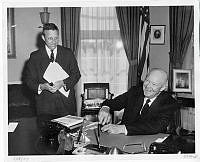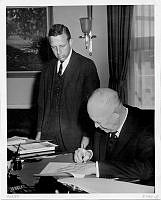Andrew Johnson

Andrew Johnson was born on December 29, 1808 in Raleigh, North Carolina. He grew up in poverty and was apprenticed to a tailor as a boy, but ran away. As an adult, he opened a tailor shop in Greeneville, Tennessee, where he met and married Eliza McCardle. The couple raised five children together, and Eliza supported her husband’s aspirations by teaching him essential reading and writing skills that prepared him for a career in politics. He became an adept stump speaker, championing the common man and vilifying the plantation aristocracy. He was elected to the House of Representatives and later the Senate, where he advocated for a homestead bill to provide farmland for white men.
Johnson’s new political position brought him increased wealth and social clout. To reflect his newfound status, he purchased an enslaved teenage girl named Dolly and her younger half-brother, Sam. Dolly later gave birth to three children—Liz, Florence, and William—who inherited their mother’s enslaved status and also became the property of the Johnson family. The father of Dolly’s children is unknown, but it is possible that Andrew Johnson (or one of his sons) may have fathered her children. Click here to learn more about the enslaved households of President Andrew Johnson.
After the election of Republican Party candidate Abraham Lincoln, southern states began seceding from the Union. By the time Lincoln took the oath of office, seven states had already left the Union, with four more to follow—including Johnson’s home state of Tennessee. During the crisis, Johnson remained in the United States Senate after his state seceded, the only southern senator to do so. In recognition of his commitment to the Union, President Lincoln appointed him military governor of Tennessee in 1862. In this position, Johnson began to support emancipation—not because he supported racial equality, but for military expediency. His primary concerns were ending the war quickly and crippling the Confederacy. To prove his new stance (and loyalty to President Lincoln), Johnson freed the enslaved individuals he owned in 1863 and ordered total emancipation in Tennessee the following year. His actions appealed to the different factions and leaders within the Republican Party, including President Lincoln who desired a political ticket that represented unity and a commitment to preserve the Union. As a result, the party nominated Johnson, a southerner and a Democrat, for vice president.
President Lincoln’s tragic and unexpected assassination thrust Andrew Johnson into the presidency. He moved into the White House with his family and brought Florence and William as paid workers. But President Johnson’s racial prejudices and inability to heal a broken nation quickly became a larger problem. Johnson pardoned all who would take an oath of allegiance to the Constitution of the United States but required Confederate leaders and men of wealth to obtain special presidential pardons. While he pursued reconciliation with southern white citizens, he generally ignored the implementation of “Black Codes” and other racist policies by state legislatures that infringed upon the rights of newly-freed African Americans.
Radical Republicans in Congress lambasted Johnson's approach to Reconstruction. They gained the political support of northerners who were dismayed to see southerners voting many prewar leaders back into office. The Radicals refused to seat any senator or representative from the Confederacy. They also passed the Civil Rights Act of 1866 to protect the rights of formerly enslaved individuals, which Johnson subsequently vetoed. The Radicals mustered enough votes to pass the legislation over his veto—one of fifteen times that Congress voted to override President Johnson.
A few months later, Congress submitted the 14th Amendment to the states, which specified "All persons born or naturalized in the United States, and subject to the jurisdiction thereof, are citizens of the United States and of the state wherein they reside No state shall…deprive any person of life, liberty, or property, without due process of law." President Johnson publicly expressed his disapproval of the amendment and encouraged state legislatures to reject it. All former Confederate states, except Tennessee, refused to ratify the amendment. Two violent race riots broke out in Memphis and New Orleans in 1866. Dozens of African Americans were beaten and killed—furthering the argument that the federal government needed to do more to protect African-American citizens.
After the Radical Republicans won an overwhelming victory in congressional elections that fall, they crafted their own Reconstruction plan, placing southern states under martial law and passing other laws to restrict the powers of the president. In February 1868, Johnson moved to dismiss Secretary of War Edwin M. Stanton without Senate approval during full session, which violated the Tenure of Office Act. This law had been passed by Radical Republicans a year earlier, vetoed by Johnson, and then overridden by Congress. Stanton’s dismissal triggered impeachment proceedings and the House voted to charge Johnson on eleven articles of impeachment. The Senate tried Johnson in the spring of 1868 and voted on three of the articles, acquitting him by a single vote each time.
In 1875, Johnson felt vindicated when the citizens of Tennessee elected him to the Senate that had nearly thrown him out of the presidency, but he died a few months later on July 31,1875 after suffering a stroke.





































